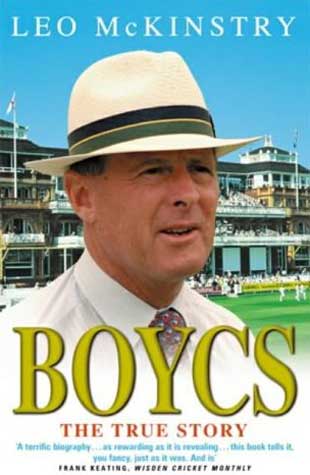Few cricketers have polarised opinion quite so much as Geoffrey Boycott. You either loved him as a batsman or hated him; and it's much the same in the commentary box. Speaking personally, I admired his application as a batsman, and I also think he's in the top drawer, alongside Richie Benaud and Ian Chappell, as a commentator who tells you what's goin' off out there. Bill Sinrich, who was in charge of Sky TV's coverage when they broadcast their first overseas tour, England's trip to the West Indies in 1989-90, said that as a commentator Boycott "fulfilled all our hopes. He was animated, intelligent, informed, with opinions that got the attention of most people."
It's difficult to find a balanced book about the legend that is Sir Geoffrey. Previous biographies were either written from the pro corner (by John Callaghan, in 1982) or violently anti (Don Mosey, 1985). But then in 2000, Leo McKinstry, a regular contributor to the op-ed pages of the Daily Mail and other newspapers, produced the nearest thing yet to a balanced
account.
McKinstry is, broadly speaking, in the pro-Boycott camp, but is detached enough to admit that not everything in the garden was rosy. Plenty of witnesses for the prosecution are produced. Martin Gray, a club player for Leeds, considered Boycott his hero... until they batted together: "He just treated the match like batting practice. His attitude was just unbelievable. He couldn't care less if we won or lost... We had a partnership of over 100. He got 96 and I got six. In every over, off the fifth or sixth ball he would take a single and keep the strike. To all the other balls he hit either four or nothing. He was such an arrogant, selfish man that I changed my opinion of him completely. He sickened me totally." Don Wilson, a long-time team-mate, said: "Even though I don't like him, I would never deny that he was a great player. The trouble was that if he hadn't scored a hundred, he really couldn't give a damn. There were times when we were like a yacht without a rudder because he was thinking about his own game. There was a terrible atmosphere in the dressing-room."
Other players weren't as scathing, though. Howard Cooper, a medium-pacer who also played under Boycott for Yorkshire, thought he was a decent skipper, "a very thoughtful captain". Tony Greig wanted Boycs in the side when he took
over as England captain: "Sure the bloke was slow on occasions, but our problem was scoring runs, not the speed at which they were scored. Besides, who cares when you're playing Test cricket?"
McKinstry doesn't forget Boycott the family man. We are reminded of his love for his mother, and his anguish when she died of cancer in 1978, just days before Boycott was sacked as Yorkshire's captain. Rachael, the mother of his daughter, says: "He is tremendously loyal; and caring... He might be this big, extrovert personality to the public, but to Emma he's just a dad."
(They were not married when the book was published, but did wed later, after Boycott had his own struggle with cancer.)
Boycott the paradox, then. If you're in the anti camp, McKinstry probably won't win you over. But he does give you a balanced account of a batsman who, for almost all of his 25-year career, was the wicket the opposition wanted most - not only because they probably disliked him, but because he was the man most likely to score a hundred against them.
From the book:
"Boycott was certainly aware of his image as a leading Test cricketer, and could be absurdly jealous of any slight on his reputation as a batsman. Rodney Cass [a fellow Yorkshireman who kept wicket for Worcestershire and Essex] was working at a school in South Africa in 1967 while Boycott was coaching at King David College. 'We had a match between our schools and at the end of the game, all these kids were gathered around Geoff, wanting autographs. He was signing away and talking and I said to him: 'What do you think of my No. 3, not a bad little player, is he?' And with 200 kids listening, he replied, 'Ay, he's a good player him, all right.' I said, 'I think he plays the on-drive as well as anybody I've ever seen.' And Geoff
exploded: 'He doesn't play it as good as me.' And he meant it."
Boycs: The True Story
by Leo McKinstry
Partridge Press, 2000
